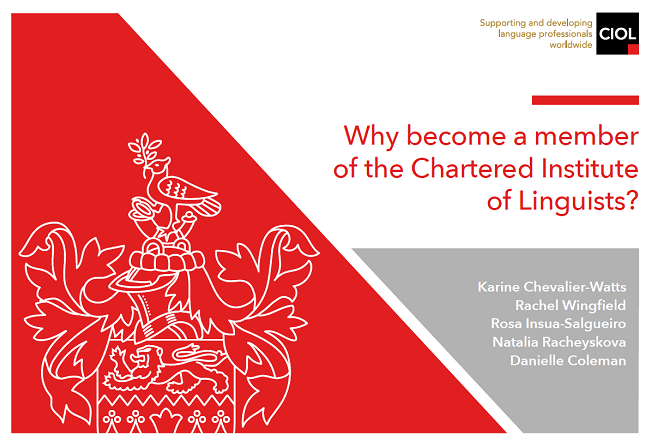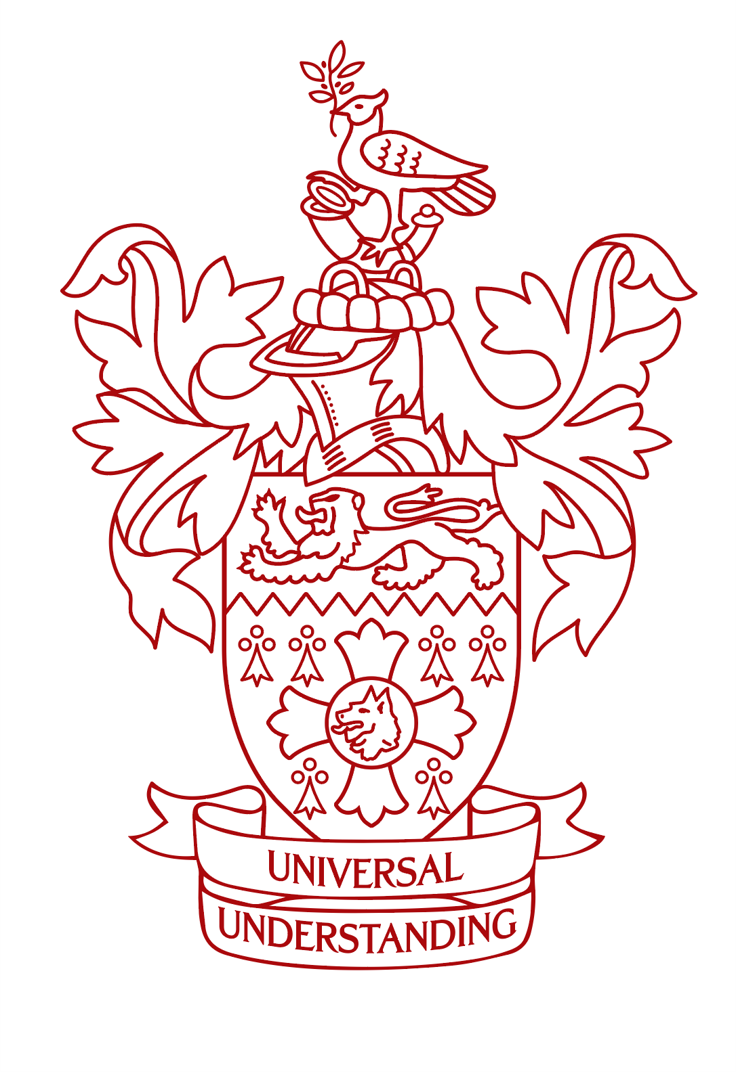
Updated for 2025 by Gwenydd Jones
If you’ve ever worked in the world of languages, you’ll know that it can feel both exciting and challenging. There are plenty of opportunities, but also concerns like uncertain rates, clients who don’t always understand your value and the constant need to update your skills. As a professional linguist, standing out as credible and qualified is vital. That’s where the Chartered Institute of Linguists (CIOL) comes in.
In this guide, we’ll explore what CIOL membership offers. Read on to discover why so many professionals recommend it and how it could transform your career.
What is the Chartered Institute of Linguists (CIOL)?
Founded in 1910 and awarded a Royal Charter in 2005, CIOL has built a global reputation as the leading professional body for linguists. CIOL supports language professionals worldwide. It contributes to their professional development through different initiatives and membership opportunities. From translators and interpreters to educators and language consultants, CIOL promotes standards for best practice. It is a professional home for anyone who works with languages.
Over the decades, CIOL has adapted to our changing world. It does this by offering networking, mentoring and webinars, supporting members through challenging times and helping linguists navigate technology. Its focus is to make sure linguists are recognised, supported and valued.
Membership isn’t just about paying a fee to be able to put letters after your name. It’s about belonging to a community, having access to resources that help you grow and earning recognition that appeals to clients, agencies and institutions.
The value of the Royal Charter
Receiving a Royal Charter was a major milestone for CIOL and for language professionals. It formalised CIOL's role as a trusted authority and the UK’s lead for languages, setting it apart from other associations. Today, the Charter means CIOL membership has global significance. It reassures clients and employers that members meet recognised professional standards. The Charter also ensures CIOL’s qualifications are respected by government departments, agencies and universities.
Professional recognition that stands out
Unlike medicine or law, translation and interpreting are unregulated professions. That means anyone can claim to be a linguist. This makes it harder for professionals to prove their value and credibility.
CIOL membership gives you independent accreditation. Full members can write the designatory letters MCIL (Member of CIOL) after their names. They can also use the CIOL logo and a link to prove their status. You can include them in your email signature and on your CV, invoices and LinkedIn profile to generate trust. It makes a difference.
Danielle Coleman MCIL CL describes the CIOL logo as a 'visual shorthand for guaranteed quality'. Danielle also said that being able to show her MCIL status helped her win agency tenders.

"… in an unregulated profession, I’ve found that being a CIOL member, and more recently having Chartered Linguist status, has been invaluable."
Danielle Coleman MCIL CL
Translator, BA Hons, DipTrans
Chartered Linguist status
For experienced professionals, the next step after membership is Chartership. This is comparable to being chartered in other professions like accountancy and engineering.
Chartered Linguist is a protected title. Only CIOL can grant it, and it’s recognised worldwide. To achieve it, members must demonstrate high levels of linguistic skill, commitment to continuing professional development (CPD) and ethical practice.
For many, becoming Chartered has been career-changing. It brings new business opportunities, helps with rate increases and boosts confidence in negotiations with clients.
Karine Chevalier-Watts MCIL CL says: ‘Becoming a CIOL member, then a Chartered Linguist, has been life-changing for me, both professionally and personally, with the incredible opportunities it has offered.'

"Becoming a CIOL member and having my profile on the CIOL directory brought me far more clients than I would have ever expected"
Karine Chevalier-Watts MCIL CL
Director & Owner of KLAS Languages
Get found: visibility through CIOL
A lot of freelancers find marketing time consuming. That is why CIOL helps work come to you through the Find-a-Linguist directory, an online database of qualified and Chartered Linguists.
Clients use the directory to find professionals. These clients range from people who need certified translations to multinational companies, institutions and publishers.
For some members, the directory has brought regular work. Requests for certified translations are common. But many members have found other types of projects this way.

"I was able to ‘fulfil my dream of becoming a literary translator after publishers contacted me via Find-a-Linguist."
Natalia Racheyskova MA MCIL CL
Qualified translator, interpreter, and teacher of languages
Get published in The Linguist or as a guest blogger
Members can contribute to The Linguist magazine, which offers visibility and professional recognition. For many, being published has helped their reputation and brought new opportunities. We also invite our members to contact us if they would like to write a post for our CIOL Voices blog.
Continuous professional development (CPD) made easy
In a profession that evolves quickly, standing still isn’t an option. The CPD record tool helps members document their training activities. This is useful if you want to achieve Chartership, which requires a record of CPD activity.
Webinars, community and conferences
CIOL runs a busy programme of events. The member-exclusive webinar and training library contains over 200 recordings. Topics include everything from healthcare interpreting to UX translation and transcreation.
Attending these webinars will help you stay focused and motivated. You will discover lots of new areas of your profession. CIOL also runs face-to-face events, Conference days and an Online Conference each year.
Rosa Insua-Salgueiro MCIL CL says 'The aspect that I enjoy the most as a member of CIOL is networking and being part of the CIOL community.'

"...I have met wonderful colleagues, linguists with different backgrounds and language combinations and great ideas..."
Rosa Insua-Salgueiro MCIL CL
English to Spanish translator and interpreter
Mentoring
You can join the CIOL mentoring program to get support from a mentor. If you have skills and knowledge to share, maybe you would like to become a mentor.
- Achieve your career goals faster.
- Improve your interpersonal skills.
- Get a real sense of belonging.
Rachel Wingfield MCIL CL said of the CIOL community: 'It really is like having a family of mentors, and mentees.'

"By joining CIOL I was able to tap into a large pool of resources and a supportive community of like-minded linguists."
Rachel Wingfield MCIL CL
BA (Hons) MA, CELTA DipTrans
CIOL’s role in setting standards
CIOL doesn’t just support members; it sets global standards. Under the motto of Universal Understanding, CIOL 'believes in a world which values every language, every culture and every linguist'.
CIOL's Language Level Frameworks provide a comprehensive point of reference on linguistic competence for linguists, agencies, employers and governments.
CIOL hosts the Secretariat for the All-Party Parliamentary Group (APPG) on Modern Languages. The APPGML is a cross-party group of MPs and members of the House of Lords. CIOL works to promote a greater understanding of the work of linguists, the key competences and skills that linguists have and the benefits of learning languages. This is another way that CIOL shows its commitment to advocating for the languages community.
Regulated qualifications for linguists
Through CIOL Qualifications, CIOL delivers three fully regulated exams:
- Certificate in Translation (CertTrans);
- Diploma in Translation (DipTrans);
- Diploma in Public Service Interpreting (DPSI);
CIOL Qualifications are recognised by government departments, agencies and universities. This makes them ideal for professional linguists. Many employers put high value on these qualifications combined with professional membership.
You can also take CIOL Certified English and Language Level Assessments in a very wide range of languages. These are a convenient and affordable way to assess and certify your spoken language level.
How to Join the CIOL
The membership process is straightforward. Apply online and ask us if you have any questions. You can start small by joining as a Student or Affiliate member and then upgrade as you grow into being a Professional linguist.
Membership grades and routes
CIOL offers entry points for all stages of your career:
- Student and Affiliate members can take advantage of CIOL training and mentoring to help them get started or maintain their language levels.
- Associate (ACIL) is the first professional grade and has a fast-track application process for those with relevant qualifications.
- Full member (MCIL) is for professionals with suitable qualifications and/or experience.
Once you're a full member, you can work towards becoming a Chartered Linguist.
Final thoughts: why CIOL is worth it
So, why join CIOL and become part of a community that values professional membership?
- Recognition: prove your skills in an unregulated industry.
- Visibility: be found by clients through trusted directories.
- Development: keep your knowledge sharp with CPD.
- Community: connect with peers and mentors and grow your network.
- Support: access tools, templates, insurance and discounts.
As Danielle Coleman MCIL CL put it: 'I can’t think of a downside to becoming a member.'
Membership is open to any linguist. Learn more about how CIOL can help you in your journey to becoming a Chartered Linguist and advancing your career. Apply for membership today.
This update was produced based on the CIOL Guide 'Why become a member of the Chartered Institute of Linguists' by Karine Chevalier-Watts, Rachel Wingfield, Rosa Insua-Salgueiro, Natalia Racheyskova and Danielle Coleman.

